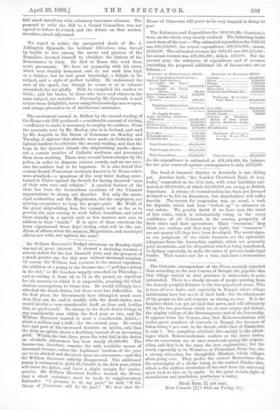Sir William Harcourt's Budget statement on Monday night was not
of great interest. It showed a declining revenue, a minute deficit for the last financial year, and the prospect of a much greater one for this year without increased taxation. Of course Sir William had recourse to the easiest expedient, the addition of a penny to the Income-tax,—" putting a penny in the slot," as Mr. Gosohen happily remarked on Thursday,— and so raising it from 6d. to 7d. in the pound, an expedient for his recourse to which it is impossible, granting the Glad- etonian assumptions, to blame him. He would willingly have attacked the death-duties, but there were two difficulties. In the first place, the Government have attempted much more than they can do, and to meddle with the death-duties now would involve a very considerable draft on time and, besides this, no good result. No change in the death-duties brings in any considerable sam within the first year or two, and Sir William Harcourt wanted to meet a considerable deficit,— about a million and a half,—for the current year. He would have put part of the increased taxation on spirits, only that the duty on spirits shows a declining instead of an increasing yield. Within the last three years the total fall in the duties on alcoholic substances has been nearly £1,000,000. The Income-tax, therefore, remains the only available means of increased revenue, unless the legitimate burdens of the year are to be shirked and devolved upon our successors,—and this Sir WilliamHarcourt entirely disapproved. The additional penny is estimated to yield £1,750,000 in the first year, which will cover the deficit, and leave a slight margin for contin- gencies. Sir William Harcourt further warned the House that a stout resistance must be made to supplementary Estimates. "I promise to do my part," he said, "if the House of Commons will do its part." We fear that the House of Commons will prove to be very languid in doing its part.


















































 Previous page
Previous page